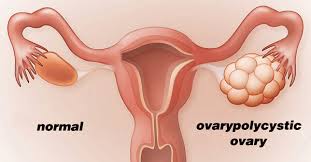Polycystic ovary syndrome (PCOS) is a common hormonal disorder that affects women of reproductive age. It is estimated that up to 10% of women of childbearing age have PCOS. In this blog post, we will discuss the diagnosis, treatment, and impact on fertility of PCOS. We will also cover lifestyle changes and medical treatments that can help manage the condition, as well as fertility treatments available for PCOS patients.
Diagnosis of PCOS
The diagnosis of PCOS is typically based on the presence of at least two of the following three criteria:
- Irregular periods or anovulation (lack of ovulation)
- Elevated levels of androgens (male hormones) in the blood
- Ovaries that appear enlarged and contain multiple small follicles (cysts) on an ultrasound
Treatment of PCOS
The treatment of PCOS depends on the individual symptoms and goals of the patient. Lifestyle changes, such as regular exercise and a healthy diet, can help manage weight and improve symptoms. Medical treatments, such as hormonal birth control pills, can regulate periods and reduce the levels of androgens in the body. Metformin, a medication used to treat diabetes, can also improve insulin resistance, which is often associated with PCOS.
Impact of PCOS on Fertility
PCOS can significantly impact fertility. The hormonal imbalances associated with PCOS can disrupt ovulation and make it difficult to conceive. In addition, women with PCOS are at a higher risk of miscarriage and pregnancy complications, such as gestational diabetes and pre-eclampsia.
Lifestyle Changes for PCOS
Lifestyle changes can play a significant role in managing PCOS. Eating a healthy, balanced diet and engaging in regular physical activity can help improve insulin resistance, which is often associated with PCOS. Maintaining a healthy weight can also improve symptoms and reduce the risk of complications.
Medical Treatments for PCOS
In addition to lifestyle changes, medical treatments can help manage the symptoms of PCOS. Hormonal birth control pills can help regulate periods and reduce the levels of androgens in the body. Metformin, a medication used to treat diabetes, can also improve insulin resistance, which is often associated with PCOS. Myo-inositol (MI) increases insulin sensitivity, decreases hyperandrogenism, and improves the menstrual cycle. Clomiphene citrate (Clomid) and Letrozole are medications that can be used to induce ovulation in women with PCOS.
Fertility Treatments for PCOS
For women with PCOS who are struggling with fertility, fertility treatments such as ovulation induction, intrauterine insemination (IUI) and in vitro fertilization (IVF) can be effective options. These treatments can help increase the chances of pregnancy by controlling ovulation and fertilization. At New Direction Fertility Centers, we specialize in PCOS care and have high success rates for PCOS patients due to our customized treatments.
Conclusion
PCOS is a common hormonal disorder that can significantly impact fertility. Lifestyle changes, such as regular exercise and a healthy diet, can help manage symptoms. Medical treatments, such as hormonal birth control pills, metformin, and myo-inositol, can also be effective in managing the condition. For women with PCOS who are struggling with fertility, fertility treatments such as ovulation induction, IUI, and IVF can be effective options. At New Direction Fertility Centers, we specialize in PCOS care and have high success rates for PCOS patients. If you have PCOS and are struggling with infertility, it is important to speak with your healthcare provider about the best treatment options for you.

